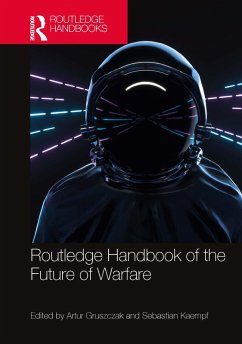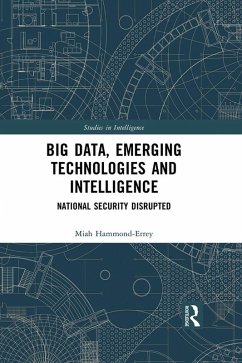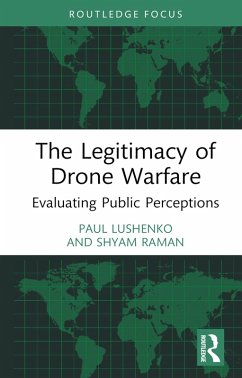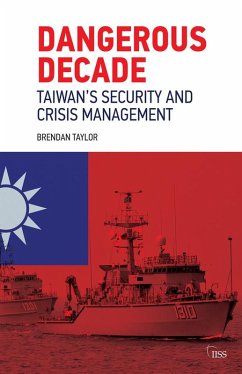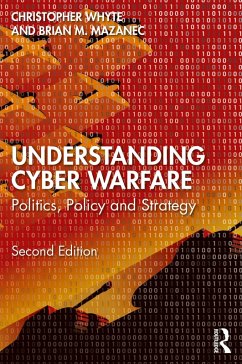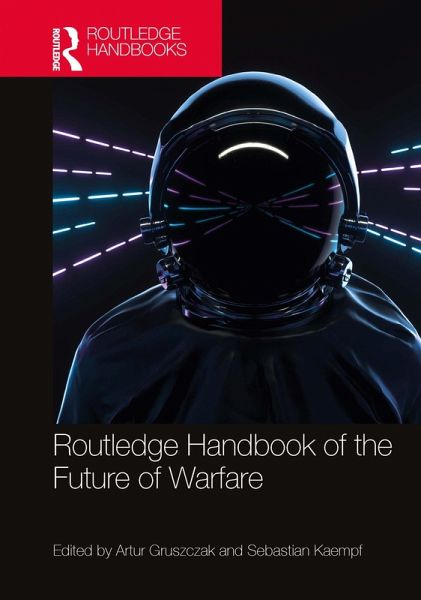
Routledge Handbook of the Future of Warfare (eBook, PDF)
Versandkostenfrei!
Sofort per Download lieferbar
47,95 €
inkl. MwSt.
Weitere Ausgaben:

PAYBACK Punkte
24 °P sammeln!
This handbook provides a comprehensive, problem-driven and dynamic overview of the future of warfare.The volatilities and uncertainties of the global security environment raise timely and important questions about the future of humanity's oldest occupation: war. This volume addresses these questions through a collection of cutting-edge contributions by leading scholars in the field. Its overall focus is prognostic rather than futuristic, highlighting discernible trends, key developments and themes without downplaying the lessons from the past. By making the past meet the present in order to en...
This handbook provides a comprehensive, problem-driven and dynamic overview of the future of warfare.
The volatilities and uncertainties of the global security environment raise timely and important questions about the future of humanity's oldest occupation: war. This volume addresses these questions through a collection of cutting-edge contributions by leading scholars in the field. Its overall focus is prognostic rather than futuristic, highlighting discernible trends, key developments and themes without downplaying the lessons from the past. By making the past meet the present in order to envision the future, the handbook offers a diversified outlook on the future of warfare, which will be indispensable for researchers, students and military practitioners alike. The volume is divided into six thematic sections. Section I draws out general trends in the phenomenon of war and sketches the most significant developments, from the past to the present and into the future. Section II looks at the areas and domains which actively shape the future of warfare. Section III engages with the main theories and conceptions of warfare, capturing those attributes of contemporary conflicts which will most likely persist and determine the dynamics and directions of their transformations. The fourth section addresses differentiation and complexity in the domain of warfare, pointing to those factors which will exert a strong impact on the structure and properties of that domain. Section V focuses on technology as the principal trigger of changes and alterations in the essence of warfare. The final section draws on the general trends identified in Section I and sheds light on how those trends have manifested in specific local contexts. This section zooms in on particular geographies which are seen and anticipated as hotbeds where future warfare will most likely assume its shape and reveal its true colours.
This book will be of great interest to students of strategic studies, defence studies, war and technology, and International Relations.
The volatilities and uncertainties of the global security environment raise timely and important questions about the future of humanity's oldest occupation: war. This volume addresses these questions through a collection of cutting-edge contributions by leading scholars in the field. Its overall focus is prognostic rather than futuristic, highlighting discernible trends, key developments and themes without downplaying the lessons from the past. By making the past meet the present in order to envision the future, the handbook offers a diversified outlook on the future of warfare, which will be indispensable for researchers, students and military practitioners alike. The volume is divided into six thematic sections. Section I draws out general trends in the phenomenon of war and sketches the most significant developments, from the past to the present and into the future. Section II looks at the areas and domains which actively shape the future of warfare. Section III engages with the main theories and conceptions of warfare, capturing those attributes of contemporary conflicts which will most likely persist and determine the dynamics and directions of their transformations. The fourth section addresses differentiation and complexity in the domain of warfare, pointing to those factors which will exert a strong impact on the structure and properties of that domain. Section V focuses on technology as the principal trigger of changes and alterations in the essence of warfare. The final section draws on the general trends identified in Section I and sheds light on how those trends have manifested in specific local contexts. This section zooms in on particular geographies which are seen and anticipated as hotbeds where future warfare will most likely assume its shape and reveal its true colours.
This book will be of great interest to students of strategic studies, defence studies, war and technology, and International Relations.
Dieser Download kann aus rechtlichen Gründen nur mit Rechnungsadresse in A, B, BG, CY, CZ, D, DK, EW, E, FIN, F, GR, HR, H, IRL, I, LT, L, LR, M, NL, PL, P, R, S, SLO, SK ausgeliefert werden.




